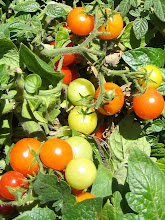
I've spent the last few days down at the
Sustainable Living Festival, an excellent and varied event for the community. A lot of interesting organisations, both volunteer groups and businesses, have stalls, but I spent more time listening to the interesting array of speakers.
It was a good opportunity to listen to Professor Ross Garnaut delve into his greenhouse emissions research, focusing on
transport. One option to reduce our transport emissions is to switch to electric cars. Garnaut pointed out that the electricity supply would have to be from a renewable source. If Victorians switched to electric cars with continued reliance on electricity generated from dirty brown coal, our greenhouse emissions would actually increase.
I was also lucky to hear
Peter Singer speak on climate change as an ethical issue and the possible options of how each country could take responsibility for cutting greenhouse emissions. You could look at historical emissions or a future, equal quota up until 2050. By that method, based on current per capita emissions, Australia and USA would run out of its quota in six years, Germany in14 years, China in 24 years and Burkina Faso in over 2000 years (these figures are from my memory). That gives some perspective on each of our ecological footprints!
Both Gilbert Rochecouste from
Village Well and Andrew Lucas from
Transition Bell both spoke on what I am excited about: relocalising for a resilient, happy community. I really think this enthusiasm can be harnessed to effectively address peak oil and climate change. And have fun while doing it! Transition Bell have organised some really fun activities, including cooking with the local Croatian community. I love their audacious claims to titles such as “Fruit Tree Capital of Geelong”.
David Holmgren, cofounder of permaculture, spoke on designing fire resilient communities and landscapes. He’s a big advocate for designing the home area as the refuge, with a house being surrounded by a food garden creating an effective fire barrier (as you’re very likely to want to water your tomatoes and hence keep the area hydrated). I’ll have to read his “
The Flywire House: A case study in design against bushfire”, available as a free eBook and has been reprinted.
I also bought some baby blue organic cotton sheets by
Organature to match my hand-woven, naturally dyed bedspread from
Guatemala. They use the off cuts for hankies (I have always used hankies over tissues and mine definitely needed replacing). I quizzed a few ecologically minded printers for my future printing needs,
Print Together and
Complete Colour Printing. And I subscribed to the
Earth Garden magazine, which gives some good practical advice on sustainable living, some of which is by permaculture practitioners.

The Earth Garden magazine sitting on my organic sheets and naturally dyed bedspread.









